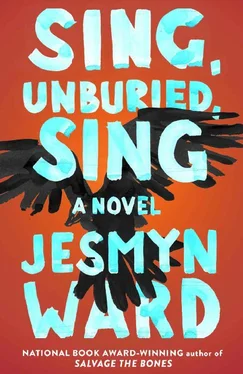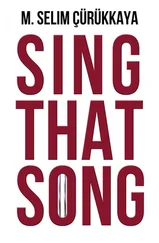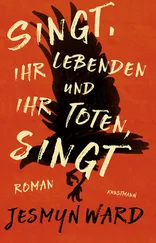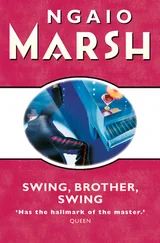* * *
When I wake up, it’s midmorning, and Leonie done pulled off the highway. The atlas says we should take Highway 49 all the way up, deeper north, into the heart of Mississippi, and then get off and drive a ways to get to the jail, which Leonie has marked on the state map with a black star, but we’re not following the map anymore. We pass a grocery store, a butcher. A sagging building with a flat roof and a faded sign: Lumber Wholesale. The buildings thin and the trees thicken until we’re at a stop sign and there’s nothing but trees, and when we roll through the intersection, the road turns to dirt and rocks.
“You sure you know where we going?” Leonie asks Misty.
“Yeah, I’m sure,” Misty says. It’s stopped raining, and the air is fuzzy with fog. Misty rolls down the window and holds her cell phone out. Aside from the chug and pull of Leonie’s car, it’s quiet; the trees are still and tall. To the left of the car, the trunks are brown and healthy, the undergrowth sparse. To the right of the car, the forest looks recently burned. The trunks are black halfway up, and the undergrowth is thick and bright green. I wonder at the stillness of it all. We are the only animals rooting through.
“Ain’t shit out here,” Leonie says.
“If I could get a signal, I could call him and ease your mind, but we too far out.” Misty wipes her phone on her shirt and slides it into her pocket. “I been here before with Bishop. I know where I’m going.”
“Where we going?” I ask the front of the car. Leonie half turns so I can see her frown at Misty before she turns to the road.
“Got to stop for a minute. See some friends,” Misty throws over her shoulder. “Then we’ll get right back on the road.”
We round a bend and there is a gap in the trees, and suddenly we are among a little cluster of houses. Some have siding like Mam and Pop’s, some have insulation paper and no siding. One is a RV that looks years off the road, with wisteria draping along the top and crawling down the side. It’s like the thing has green, living hair. Chickens run in bunches as a dog, a pit bull with gray-blue fur and a gaping maw, chases them. The chickens scatter. A boy, probably four, is sitting on the ground in front of the porch steps of a house with no siding, and he is stabbing the mud with a stick. He wears a baby’s onesie that fits him like a shirt, yellow underwear, and no shoes. He wipes his hand across his face as Leonie comes to a stop and turns off the engine, and it turns his skin from pale milk to black.
“Told you I knew where we was going,” Misty says. “Blow the horn.”
“What?”
“Blow the horn. Ain’t no way I’m getting out of this car with that dog running loose.” Leonie blows, and the dog, who has stopped chasing the chickens and trotted around to the car to sniff the tires and pee on them, begins to bark. I know what he says. Get out. Inhale. Get out! Inhale. Trespasser, get out! Kayla wakes up and starts to cry.
“Take her out,” Leonie says, so I unbuckle her.
The little White boy waves his stick in the air, and then grabs it with both hands, pointing it like a rifle. His blond hair sticks to his head, curls into his eyes like worms. Pow pow , he says. He is shooting at us.
Leonie cranks the car.
“We don’t need this—”
“Yes, we do. Cut it off. Blow the horn again.”
Leonie compromises. She doesn’t cut the car off, but she does blow the horn again, one long, loud honk that makes Kayla cry harder and burrow into my chest. I try to shush her, but she can’t hear me over the barking dog, the shooting boy, the silence in that clearing in the pines, a sound as heavy and loud as the others, but not. I want to jump out of the car with Kayla, and I want to outrun that boy and his dog and that fake gun, and I want to walk us all the way home. My insides feel like they want to fight.
A White woman steps out the door of the house with no siding, steps past the dirt-faced child. Their hair is the same blondish reddish color, with the same curliness. Hers is long, down to her waist, and except for her nose, which seems swollen in her face and burns red, she’s prettier than Misty. She’s also barefoot. Her toes are pink. She coughs, and it sounds like a scraping in her throat, and walks toward the car. The dog runs up to her, but she ignores it. At least it stops barking. Misty opens the car door and sticks the top half of her body out while holding on to the frame.
“Hey, bitch!” Misty says, like it’s a term of endearment. The woman smiles and coughs at the same time. The mist is settling like dew on her hair, turning it white. “Told you we was coming.” The boy is still shooting us with his stick gun while the dog licks his face. I want to run back home. Leonie drags her hand through the hair over her right ear, scratching at her scalp. She does this when she is nervous. You going to make yourself bleed , Mam told her once, but I don’t think Leonie realizes when she does it. She scrapes so hard it sounds like nails pulled over canvas. Misty is hugging the woman, who is staring into the car. When Leonie opens her door and steps out, and says hey, I barely hear it over Kayla’s crying. She scratches again. The little boy hops up the concrete steps and disappears into the house. When Leonie walks up to the woman and all three of them begin talking to each other, her hands hang weak jointed at her sides.
* * *
The floors are uneven. They are highest in the middle of each room in the naked house, and then slope down to the four shadow-sheathed corners. The inside of the house is dim through the porch, which is crowded with boxes so all that’s left is a walkway into the living room, which is also dim and crowded with boxes. There are two sofas here and one recliner, and this is where the shooting boy sits. He is eating a pickle Popsicle. The television sits on top of a box instead of a TV stand, and it’s playing some sort of reality show about people who buy islands to build resorts.
“Through here,” the woman says to Misty and Leonie, who follow behind. Leonie stops me with a raised arm in the living room.
“Y’all stay here,” she says, before leaning forward to touch Kayla’s nose with her pointer finger and smile. Kayla’s face is still wet with tears, but she is sniffing and holding on to my neck and staring at the shooting boy as if there is something she wants to say to him, so I let her down. “I’m serious,” Leonie says, and then follows the woman and Misty into the kitchen, which is the brightest room in the house, lit by a chandelier hanging from the ceiling, laden with bulbs. There is a curtain hanging over the doorway, and the woman pulls it halfway shut and coughs and motions at the table for Misty and Leonie to sit. She opens the refrigerator. I sit on the edge of the sofa so I can watch the shooting boy in the armchair and Kayla, who is squatting feet before him with her hands in her lap, and the gap in the curtain where the women sit in the kitchen.
“Hi,” Kayla says, drawing the word out so that it’s two long syllables, her voice rolling up and down a hill. It’s the same thing she says to her baby doll when she picks it up first thing in the morning, the same thing she says to the horse and the pig and the goat, the same thing she says to the chickens, the same thing she says to Leonie when she first sees her. The same thing she says to Pop. She won’t talk much to Mam: when I carry her in the room to see her still body, Kayla shrinks into my chest and shoulder, puts on her brave face, and after five minutes of cringing away from Mam and saying shhhh with her finger in front of her lips, she says out . She never says hello to me. She just sits up or crawls over to me and puts her arms around my neck and smiles.
Читать дальше












